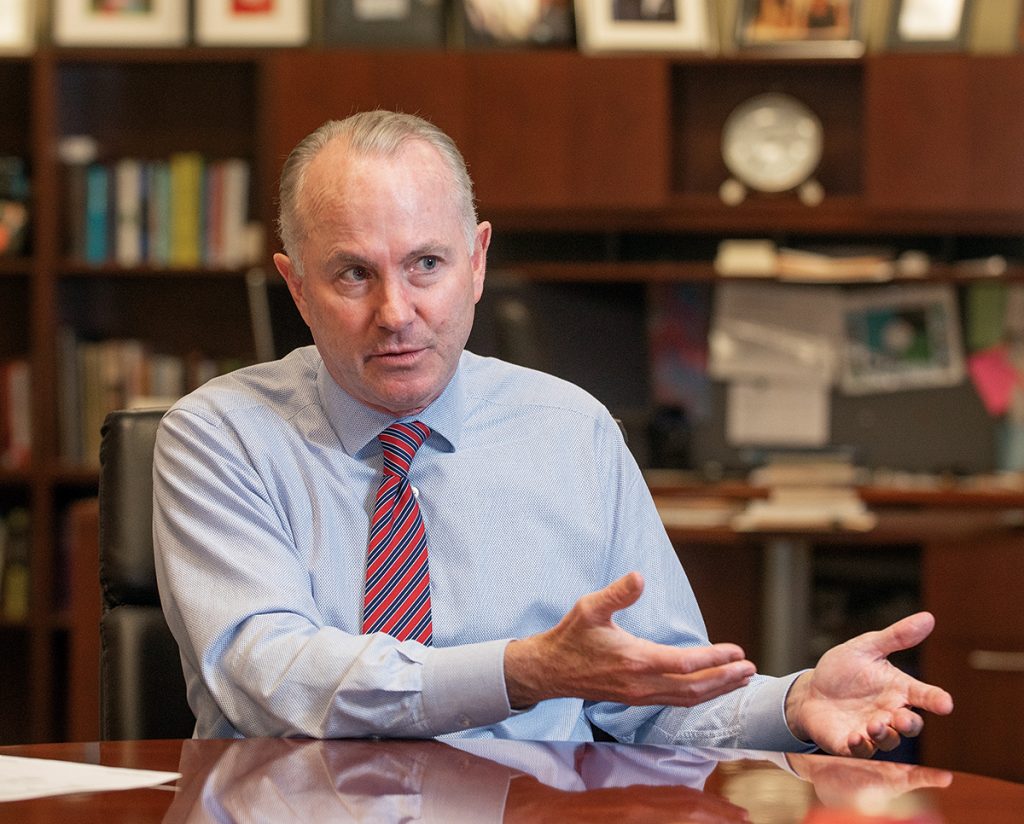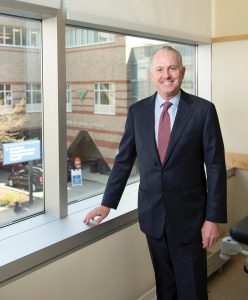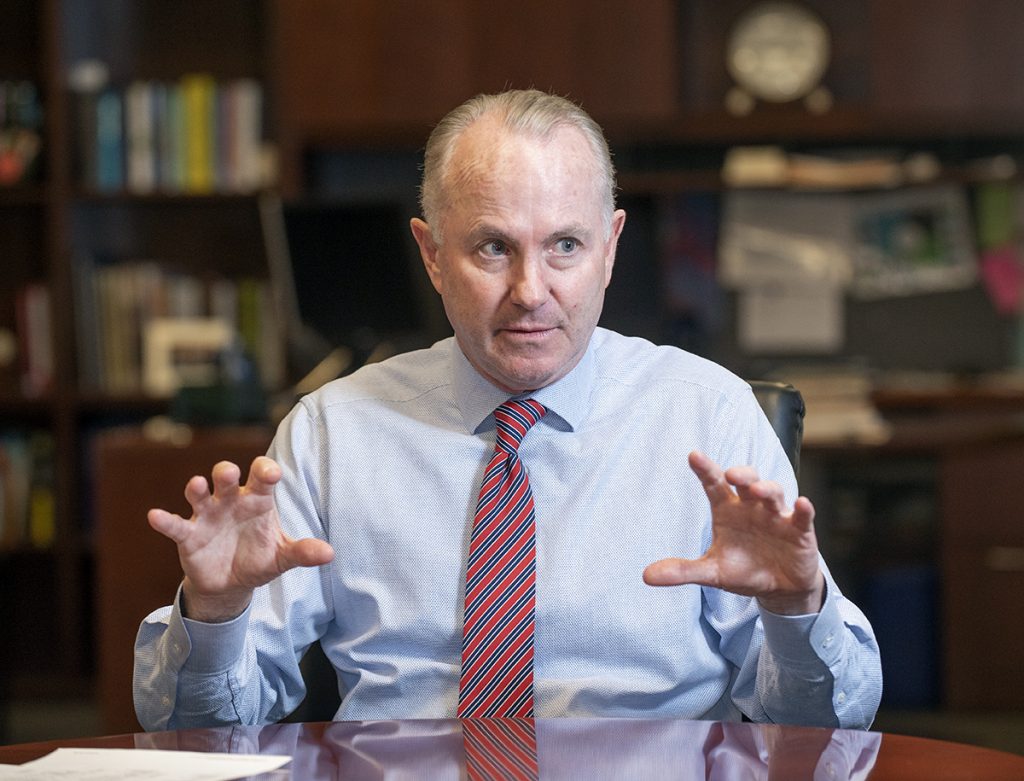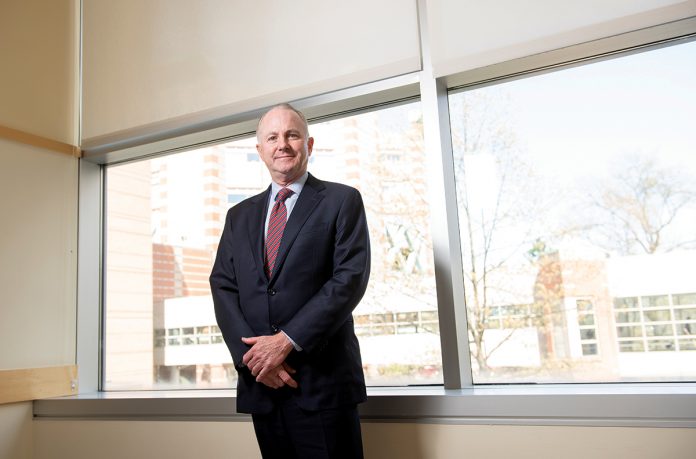Dr. Timothy J. Babineau misses seeing patients, but as Lifespan Corp.’s president and CEO for the past seven years, the former cancer surgeon has had plenty of opportunity to sharpen his business skills.
Babineau, 59, is at the helm of Rhode Island’s largest private employer at a time when the national conversation about the health care industry is swirling around the fate of the Affordable Care Act and a push toward a single-payer system or even so-called Medicare for All.
Closer to home, Babineau and his board of directors have publicly opposed a proposed merger between Care New England Health System and Boston-based Partners HealthCare that could change the state’s health care landscape.
Soliciting public support through a recently launched advertising and media campaign, Babineau, despite failed attempts in the past, is again proposing a union between Lifespan and CNE, designed to create a seamless statewide system.
Beyond the business of health care, he’s worried about a health care system in which doctors feel overworked.
“There is a doctor shortage on the horizon [nationally] that will make the nursing shortage of the 1980s pale in comparison,” he said.
And Rhode Island doctors, he added, are underpaid and threatened by a “malpractice environment” that “is just crushing people with malpractice expense.”
You have been with Lifespan for nearly 11 years. Could you have imagined the position you are in both personally and in terms of the institution you now work for? No. I love my job, I have one of the best jobs in Rhode Island, I think. I’ve been taking care of patients my whole life, and as I joked with my dad, I used to take care of them one at a time, and now I take care of them 10,000 at a time. So, it’s just about having a bigger impact. … I spent 20-plus years in Boston, and the folks we’ve been able to attract here – our researchers, our doctors, our nurses, our nurse practitioners, our employees – they are world-class. … That’s one of the things I’m most proud of – our ability to attract talent. Not only in numbers, but in quality. We’ve added about 3,000 jobs over my tenure. I’m proud of the fact that folks want to come and work here, and that we’re mission-based and that people care about what they do here. Ten years ago, I didn’t really know what this was going to look like, but I’m proud, and I’m happy, and I like my job.
[caption id="attachment_274005" align="aligncenter" width="696"]

NOT GIVING UP: Dr. Timothy J. Babineau is the president and CEO of Lifespan, which is opposing the proposed acquisition of Care New England by Boston-based Partners HealthCare. He would rather see CNE stay in Rhode Island through a merger with Lifespan, which he described as fitting together like a jigsaw puzzle, despite repeated failed attempts.
/ PBN PHOTO/DAVE HANSEN[/caption]
Why do you think so few people, including those in positions of power in the public and private sectors, are paying so little attention to the proposed Partners-CNE merger, as you have noted? I can tell you that’s changed [since Lifespan on April 24 launched its advertising campaign]. Look, we just want people to understand what’s happening. We want people to understand the facts of the deal that is currently on the table. … People are talking about it [now], people are asking the right questions, people are reaching their own ideas and their own conclusions. … The physician response has been really overwhelming. I’ve had hallway conversations, phone calls, text messages and emails, saying “Thank you for doing this,” “We really didn’t understand it,” “Thank you for raising it.” The folks I talked to still support our preference, which is an in-state solution for Care New England and Lifespan and Brown [University] to get together. But at a minimum, folks are just happy to be having this dialogue. They’re getting calls from their patients. They’re getting calls from their neighbors. I don’t know where this is going to end up, but I think we already accomplished what we set out to do, which is to raise public discourse and raise the dialogue.
When you talk about doctors, are they just Lifespan doctors or are they across the state? Across the state. Some affiliated with Care New England, some affiliated with Lifespan, some private practitioners, some retired doctors. I interact mostly with Lifespan doctors, but there have been folks from CNE and primary care groups that have said, “Thank you for doing this.”
You’ve said that one of the major consequences of a Partners-CNE merger would be loss of medical talent. Have you seen more than the usual number of your medical staff moving either to Boston or elsewhere across the country? No, it’s much too early in the process to see that. We can predict that might happen, but it won’t happen overnight. We’ll wake up three or four years from now like the banking industry and say, “Where’d everyone go?” That’s what we’re concerned about.
To play devil’s advocate, we asked some of those questions to CNE and its president and CEO, Dr. James E. Fanale. He said only 1% of its patients go to Boston’s Brigham and Women’s Hospital, which is at full capacity. Why do you think that’s not going to be the case if the proposed merger is approved? First, because that has not been their track record for the past six years. Following the creation of their cardiology program at Kent [County Memorial Hospital], we have hard market data saying 120-150 patients who need open-heart surgery, on an annual basis, got it done at a Partners hospital when it could have been done here in Rhode Island. Second, we’ve heard ranges from 1% from Fanale and [Dr. Betsy] Nable to 10-20% from [Dr. Chester] Hedgepeth. The question is: As a percent of what patient base? We know that Kent sees approximately 300,000 patients per year, so the ranges of potential cases leaving Rhode Island is wide. Finally, as you’ve heard from our doctors, it is precisely those complex cases in cardiac, neuroscience and cancer that need to stay in the state to be able to maintain local expertise. One percent doesn’t sound like a big number, but the real question is: Who’s in that 1%?
How many open-heart surgeries are done each year in Rhode Island? Our program here, we run between 550 and 600 cases. At Brigham, the number is north of 1,000.
At a recent editorial board meeting with us, you said the solution for providing the best possible local health care is creating an “in-state, unified academic health care system.” You also said Lifespan needs to fundamentally change its business model. What would both of those scenarios look like? I came here 11 years ago with the promise of a CNE-Lifespan merger. It’s always made sense, and it just hasn’t happened. That doesn’t mean we shouldn’t try again. It’s too important to not try again. We’ve got different people at the table, we’ve got different state leaders, we’ve got different economics, we’ve got different financial pressures, the environment is different. Fee for service doesn’t work, health care is too expensive. And now we’re talking five, 10, 15 years down the road. So how do we control health care costs, how do we improve quality? At the end of the day, it’s about value – the outcome of the care, divided by the cost of the care. We agree we need to move in the direction of value-based care. All that means is rather than getting paid per knee replacement, per tonsillectomy, per flu shot, you get financially rewarded for the overall health and care of the patient. The only way to do that in my opinion is to have the patient receive all of their care in a complete and integrated health care delivery system. One health care system, one electronic record, one set of doctors, one set of management, where all the care can be delivered. There are pieces missing in the CNE portfolio and there are pieces missing in the Lifespan portfolio. They almost fit together like a jigsaw puzzle. The Women & Infants [Hospital] piece, the Rhode Island Hospital piece, the Butler [Hospital] piece, the Bradley [Hospital] piece, they come together not overlapping and redundant, they come together like a very nice jigsaw puzzle and then we have what the state has lacked – at least one complete health care system. Massachusetts has four, we have zero. I think we deserve at least one. And if CNE goes to Partners, my fear is that opportunity will be lost forever.
You’ve said you want to stop the process and negotiate with CNE. So, let’s presume the merger does go through, and CNE has said we’d like to talk with Lifespan again, would you? Sure, of course.
[caption id="attachment_274004" align="alignright" width="248"]

ATTRACTING TALENT: Dr. Timothy J. Babineau, who has served as president and CEO of Lifespan for the past seven years, said he’s most proud of the company’s ability to attract talent, which he described as “world-class,” adding that Lifespan has added 3,000 jobs over his tenure.
/ PBN PHOTO/DAVE HANSEN[/caption]
And what would be the endgame then? It would be a completely different dynamic. We’re on the record as trying to get a deal done with Partners-CNE and we couldn’t, and one of the things we felt very, very strongly about was keeping decision-making local. We couldn’t reach agreement on that. So, whether we could the next time around, I guess I’d be less optimistic. That was the issue. Decision-making needs to be in the state. Health care is local. We believe that the folks who live here and work here and provide care here, the folks at Lifespan, the folks at Care New England, the folks at Brown, should be the decision-makers.
You mentioned the loss of $25 million in federal support that was cut this fiscal year. Can you explain what caused the loss, and how you are making up for that? The way Medicare sets their rates, how much they pay you, depends on the wage index, the average salary in your market of your worker. There are some states that are quite rural where there aren’t big cities with big salaries, and they have a rural floor that says the Medicare rate can’t go below this threshold. There are three states in the country, Delaware, New Jersey and Rhode Island, that don’t have the imputed rural floor that makes sure our Medicare rates are at least on par with poor states, but every year national lawmakers overruled it. So, for 20 years, they would overrule the imputed rural floor and our Medicare rates were a bit better. This was the first time in 20 years that the regulatory body didn’t restore it. Literally with two weeks to go, $25 million disappeared out of our budget, overnight. Gone. As a result, we’re having a challenging financial year. Our first-quarter results are public, we’re still closing the books on our second quarter. [Editor’s note: Lifespan Corp. reported a first-quarter operating loss for fiscal 2019 of $18.4 million compared with a gain of $3.8 million in the first quarter of fiscal 2018. Excess of revenue compared with expenses (the equivalent of net income in a for-profit entity) showed a loss of $36.8 million in the period, compared with income of $6.8 million a year earlier.] We have our legislative delegation trying to work on a legislative fix.
In the summer of 2017, you said Lifespan’s patient numbers were improving, as well as its finances. But at our editorial board meeting, you referred to Lifespan as a “break-even” company. Will Lifespan be reporting a profit in the next quarterly earnings report? We haven’t closed the book yet. We had a challenging first quarter. We’re not anticipating a surplus. We can show you the operating income margins for the past eight or nine years, and we bounce around. In a good year, we’ll make $10 million in operating costs. We mostly break even, and yet we still every year invest about $100 million in capital in the place, and we’ve put $1 billion of capital into the property, plant and equipment. And that’s the difference – nonprofit health care plows whatever money there is and puts it back into the community, for-profit health care takes the money and returns it to shareholders out of state. There could not be a more black-and-white difference.
If you said, in two years we’re going to Medicare for All. … You’d destroy the health care system. You’d put people out of business.
What do you think the potential loss of the Affordable Care Act would do to finances if provisions weren’t added to state law? It would be devastating. We’re one of the expansion states and we’re very much in favor of the ACA, we’re very much in favor of Medicaid expansion. Remember, our charity care numbers prior to that were $140 million to $160 million a year; that’s a cost, not a charge, that got cut in about half overnight. So, about $80 million, because people used to pay us zero cents on the dollar, but now they’re at least getting Medicaid. Medicaid’s not great, but it’s better than nothing. So, if that were to disappear, and the ranks of the uninsured swelled again, which is what we anticipate would happen, it would be devastating financially. I’m not sure we could continue.
You’ve said that Lifespan doesn’t cover its costs for patients covered under Medicare and Medicaid. What would the economics be for Medicare for All? I think the conversation about a single-payer system in this country is a worthy conversation to have. I’m sure we could eliminate a lot of expense within our organization if we could simplify how we get paid. We take care of half a million people a year, every one of whom has a slightly different health insurance plan. If somehow we could simplify that, I think the country would be better, our patients would be happier. I’m not sure if Medicare for All is that solution. And I think people are confusing Medicare for All with a single-payer system. They’re related but they’re different.
When you say single payer, what does that mean? A single set of rules, a single set of guidelines that still include commercial insurance. So that the way commercial products and premiums and payments look in Rhode Island is the same as Connecticut, New Hampshire or California, so that we could have some standards. This is a national question, so if you’re asking how to take cost on nationally, that’s one way to do it. We have to simplify it, but if you said, in two years we’re going to Medicare for All. … This is a 10-year journey. You’d destroy the health care system. You’d put people out of business, they’re not ready for it.
[caption id="attachment_274003" align="aligncenter" width="696"]

WARNING: With “crushing malpractice expenses” and physician burnout making the field less attractive, Dr. Timothy J. Babineau, president and CEO of Lifespan, said there is a doctor shortage on the horizon nationally “that will make the nursing shortage of the 1980s pale in comparison.”
/ PBN PHOTO/DAVE HANSEN[/caption]
Some primary care practices say they are having difficulty replacing retiring baby boomers with new physicians. Have you seen this at Lifespan, and if so, why? There are things that are unique to the state, and then there are national things. Let’s talk nationally first and the whole issue of physician burnout and how hard it is to be a doctor and the demands on a physician’s time. We’ve taken a lead on this, and about 18 months ago we surveyed our physicians, and the results were sobering. They’re tired, they’re frustrated, and there’s no one reason for it. It’s something as simple as, “I can’t get anything to eat when I’m on call.” There’s just some basic things we can do and we’re addressing that. So, that’s going to be a national conversation, because there is a doctor shortage on the horizon that will make the nursing shortage of the 1980s pale in comparison, and it’s mostly because the field is becoming less attractive.
Two things in Rhode Island: Our docs get paid horribly, we’re 49th out of 50 states in terms of what our physicians get paid, and I say this carefully – we need tort reform. The malpractice environment in this state is just crushing people with malpractice expense. There’s a 12% interest rate that gets tagged on once a suit gets filed year over year, and jury awards are going up. I’m not saying patients shouldn’t be compensated when they’re injured, they absolutely should, and we try to have a conversation when we make a mistake to try to figure out what’s fair, but a suit gets filed and it doesn’t get judged upon until 10 years later, and whatever the initial amount was just grew 12% compounded annual interest. At Lifespan we provide our own malpractice insurance up to a certain threshold, and then for big awards we buy secondary insurance. We’ve had a couple of big jury awards lately and our secondary insurance carrier dropped us. Right now, Rhode Island has some of the biggest jury awards in the country in terms of absolute dollar amounts. So, we had to go back into the market and buy insurance at a much more expensive level because less and less secondary commercial insurers want to do business in Rhode Island. That’s a problem. … We have great doctors, it’s this whole 12% interest that’s just crushing us.
You’ve talked in the past about carrying your father’s medical bag while he made house calls when you were a boy and the influence that had on you. Do you ever get to see patients? If not, do you miss it? I do not see patients. I miss it immensely. There are some physician hospital executives who can still see patients part time, they’re not usually surgeons. I stopped when I could no longer maintain the volume to keep my skills up. I was a very good surgeon, and I stopped when I came here in 2008.
Elizabeth Graham is a PBN staff writer. Contact her at Graham@PBN.com.















